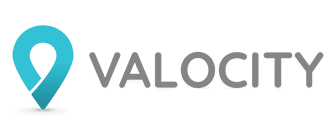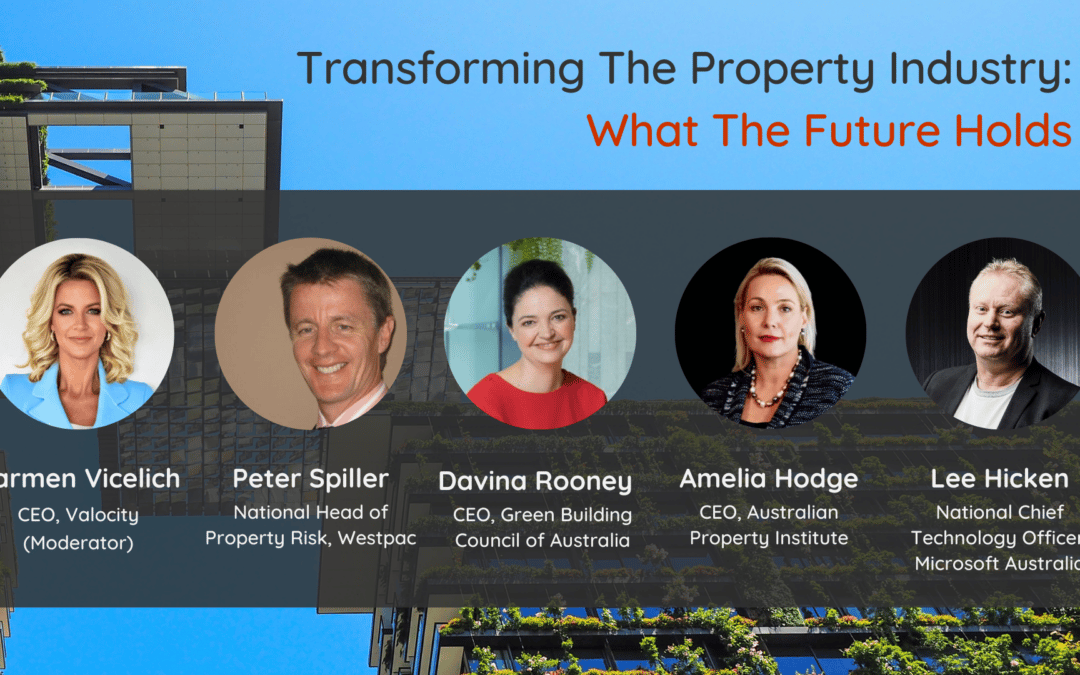Valocity recently hosted a panel of thought leaders from the banking, property, and technology sectors across Australia to share their insights and perspectives on the evolution of property valuation.
In part one, our panel of Australian experts talked about the shifts that technology is enabling in the property valuation process and what to consider when contemplating new technologies, our roles in sustainable property and green finance, and the importance of ESG.
In part two, we answer the questions that were posed to our panel around relationships that will help ensure the longevity of property valuation, whether as an industry we are ready for disruption, and how we balance technology and innovation with regulatory frameworks.
Thanks again to our panel for their insights and views:
Peter Spiller National Head of Property Risk, Westpac
Davina Rooney CEO, Green Building Council of Australia
Amelia Hodge CEO, Australian Property Institute
Lee Hicken National Chief Technology Officer, Microsoft Australia
Carmen Vicelich CEO, Valocity
What relationships should we be developing to create new solutions for a sustainable future
In the past when data was processed manually, there were only a limited number of relationships a lender could focus on to obtain the required property valuation information. Now, with digitisation comes enormous opportunity to do things differently and apply a broader lens to property valuation to build a much richer picture.
Amelia Hodge shared an example, “For a property today with a thirty-year mortgage, lenders may need to assess the risk of climate change and whether that property will still be inhabitable in three decades. You need to do a whole new piece of work because the traditional risk lens of looking at these items is no longer valid. If someone’s property is uninsurable as it’s in a high-risk area, they’re probably not going to be paying their mortgage for 30 years. The market has fundamentally changed.”
Carmen Vicelich discussed the work Valocity has been doing with the National Institute of Weather and Atmospheric Research (NIWA) in New Zealand to include as part of its service for lenders, “We’re giving data to lenders on climate change, which just a few short years ago would not have been in scope for what we do. This is essential for them to manage their risk profile.”
Microsoft and the Centre for Cyber Security Research and Innovation (CSRI) have been undertaking to develop a climate risk insurance platform, and Lee Hicken shared his thoughts, “This is exactly the idea about using data and Artificial Intelligence (AI) to understand the longevity of building investment, design and development, through the lens of financial risk, insurance risk and the cost to citizens”. To this Carmen added, “It is this collaboration and layering of information as new datasets are being created that has become ever more important”.
There’s a lot of discussion about ‘disruption’, ‘transformation’ and the future. Are valuers and lenders ready to embrace these changes?
For Peter Spiller, National Head of Property Risk at Westpac, transformation, and disruption are all part of the business maturity process. “We’re all on a similar journey in the valuation space as currently there’s a lot of time spent on elements that are not enormously valuable to the end user. We could be spending more time analysing data and putting the data into the valuation model so, it’s an evolution. Are we there yet? No. But are we willing to start the journey? Absolutely.”
For the Australia Property Institute’s role in the process, Amelia Hodge discussed how they have reviewed all the standards and the frameworks to ensure they are evolving in step with the market. “It’s our role as the industry body in conjunction with all our key stakeholders to recreate what that new world looks like, and guide people through. In 2020 when Covid hit we had to move our mindset to a virtual valuation hierarchy and advocate very hard for the right to remain operating as valuers. We’ve done it before, and I think this is now another evolution of the sector”.
Davina Rooney noted, “We see a lot of innovative practice within the current confines, and I think it’s acknowledging that there’s parts of this change that’s led by leading valuers, but there’s another part where we all need to work together to modify the frameworks in which valuers are required. Disruption is uncomfortable, particularly for people who have roles with large amounts of compliance, legal obligations and contracts wrapped around them. When we talk about this critical part of the market, we have to be looking at framework and ecosystem change to allow for those aspects.”
Lee Hicken provided insight into Microsoft’s experience with disruption and how even though you may not always be ready for it, you can work with these challenges and once again shift ahead of the curve. “Disruption is only disrupting if you weren’t expecting it. If you’re not planning for it, if you’re not prepared for it, then it will be disruptive for you. Microsoft got disrupted when Amazon and Google appeared because we weren’t looking for it. Now we’re looking for it, we’re preparing for it, and we don’t get disrupted. We get challenged and that’s a different thing. We work with that challenge and take it on. That’s how people need to be thinking about this is, don’t be disrupted, be thinking ahead of the disruption”.
How do we help facilitate the evolution of technology, particularly given the high dependency on existing frameworks that govern the industry?
Managing the balance between technology innovation and the desire to evolve with incumbent frameworks is an interesting landscape for the valuation industry to navigate. Lee Hicken noted “There’s always a lag between regulation and law and innovation and technology. There has to be and that’s a good thing to ensure the industry evolves.
The other point Lee made was around where to start the transformation, which is a challenge many organisations can find overwhelming. “The old adage is, how do you eat an elephant? You do it bite by bite. Digitisation is about finding the most impactful pain points closest to your customer and working backwards from there. Think about the people that your services deliver capabilities to and understand how technology impacts them”.
From Carmen’s perspective, the common theme around the changes we are seeing in property valuation are around sustainability, the future of profit, people, and planet and how we bring these things together in the scope of data and technology. She says “Underpinning these things is really about us instigating the change that we wish to see. We need to be the leaders and the innovators doing the disruption. Be passionate, be bold, always keep learning”.
Change is accelerating all around us
To summarise the incredible insights from the panelists, change is happening now, and it’s happening faster than has ever been experienced. There’s a lot to think about – technology, data, regulations, sustainability, and the environment. It’s vital to ensure there is synergy across all these factors, but not to become overwhelmed with the task ahead. To echo Lee Hicken’s earlier sentiment, take one bite at a time, and ensure the direction of progress is forwards.
About Valocity
Valocity is an award winning FinTech company transforming and digitising the property decisioning process globally with customers across Australia, New Zealand, India, and Asia.
Valocity digitises the entire property valuation process with its unique cloud-based valuation platform, with bespoke solutions for residential, commercial, and agricultural lending.
It combines the best of nationwide property data with global technology and advanced analytics expertise to create digitally connected workflows, automated valuation models, customised insights, and desktop valuations that enable data driven decision making and more seamless customer experiences.
For more information, please visit valocityglobal.com or contact
Sara Pesic, Head of Marketing, Valocity

